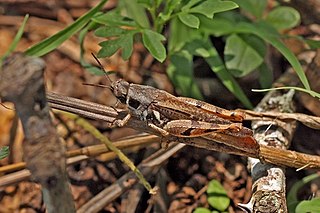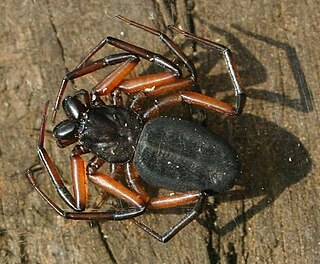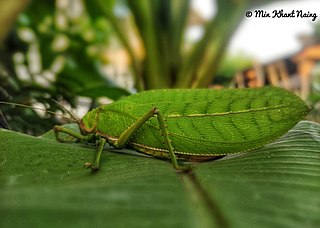
The chasers, darters, skimmers and perchers and their relatives form the Libellulidae, the largest dragonfly family in the world. It is sometimes considered to contain the Corduliidae as the subfamily Corduliinae and the Macromiidae as the subfamily Macromiinae. Even if these are excluded, there remains a family of over 1000 species. With nearly worldwide distribution, these are almost certainly the most often seen of all dragonflies.

The subfamily Catantopinae is a group of insects classified under family Acrididae. Genera such as Macrotona may sometimes called "spur-throated grasshoppers", but that name is also used for grasshoppers from other subfamilies, including the genus Melanoplus from the Melanoplinae.

The grasshopper subfamily Acridinae, sometimes called silent slant-faced grasshoppers, belong of the large family Acrididae in the Orthoptera: Caelifera.

Trochanteriidae is a family of spiders first described by Ferdinand Karsch in 1879 containing about 52 species in 6 genera. Most are endemic to Australia though Doliomalus and Trochanteria are from South America and Plator is from Asia. Platyoides species exist in southern and eastern Africa, Madagascar, and the Canary Islands with one species, P. walteri, introduced to Australia.

The Thyrididae comprise the family of picture-winged leaf moths. They are the only family in the superfamily Thyridoidea, which sometimes has been included in the Pyraloidea, but this isn't supported by cladistic analysis.

The Buthidae are the largest family of scorpions, containing about 100 genera and 1339 species as of 2022. A few very large genera are known, but a high number of species-poor or monotypic ones also exist. New taxa are being described at a rate of several new species per year. They have a cosmopolitan distribution throughout tropical and subtropical environments worldwide. Together with four other families, the Buthidae make up the superfamily Buthoidea. The family was established by Carl Ludwig Koch in 1837.

Ferdinand Anton Franz Karsch was a German arachnologist, entomologist and anthropologist. He also wrote on human and animal sexual diversity with his mother's maiden name included as FerdinandKarsch-Haack from around 1905.

The subfamily Pseudophyllinae contains numerous species in the family Tettigoniidae, the katydids or bush crickets. Sometimes called "true katydids", together with the crickets of suborder Ensifera, they form part of the insect order Orthoptera which also contains grasshoppers.
Glyphandra is a monotypic moth genus of the family Crambidae described by Ferdinand Karsch in 1900. It contains only one species, Glyphandra biincisalis, described by the same author in the same year. It is found in Cameroon, Equatorial Guinea and Togo.

The Phaneropterinae, the sickle-bearing bush crickets or leaf katydids, are a subfamily of insects within the family Tettigoniidae. Nearly 2,060 species in 85 genera throughout the world are known. They are also known as false katydids or round-headed katydids.

Bicyclus is a butterfly genus from the subfamily Satyrinae in the family Nymphalidae. The species are found in the Afrotropical realm.
Scalidognathus is a genus of Asian armored trapdoor spiders that was first described by Ferdinand Anton Franz Karsch in 1892. Originally placed with the Ctenizidae, it was moved to the Idiopidae in 1985.
Acracona remipedalis is a species of snout moth in the genus Acracona. It was described by Ferdinand Karsch in 1900 and is known from Togo, Sierra Leone and Nigeria.
Sabalia is a genus of moths in the family Brahmaeidae.

Stromatopelma is a genus of African tarantulas that was first described by Ferdinand Anton Franz Karsch in 1881. They are renowned for their potent venom that uses stromatoxin peptides to induce medically significant effects.

Julus is a genus of millipedes in the family Julidae, containing the following species:

Chilobrachys is a genus of Asian tarantulas that was first described by Ferdinand Anton Franz Karsch in 1892. They are found in India, Myanmar, Malaysia, China, Vietnam, Thailand and Sri Lanka. They are usually medium or large-sized, and they can stridulate by using small spines present on the chelicerae.
Pedinopistha is a genus of Hawaiian running crab spiders that was first described by Ferdinand Anton Franz Karsch in 1880.

The Gratidiini are a tribe of stick insects based on the type genus Clonaria and first used by Cliquennois in 2005. Genera are known to be distributed in: Africa, Europe, temperate and tropical Asia and various Pacific Islands.













